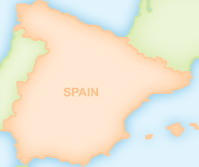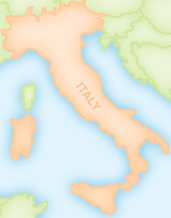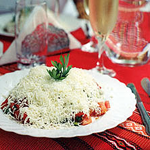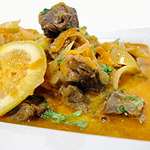|
||||||||||||||||||||||||||||||||||||||||||||||||||||||||||||||||||||||||||||||
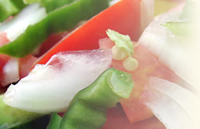
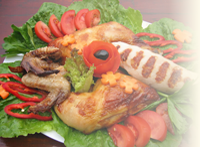
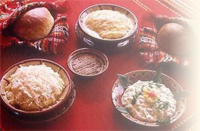
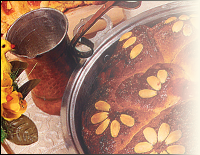 |
BulgariaBulgarian cuisine is as rich as the country’s history and consists of a mouth-watering fusion of a variety of culinary and cultural traditions. It is world-renowned for its easy, healthy, and naturally-elegant cooking methods, which utilize a variety of herbs and spices to emphasize the pure taste and aroma of the fresh ingredients.The eating experience in Bulgaria is regarded not so much as necessity, but rather as a custom. One of the most revered parts of the meal consists of the appetizers or, as Bulgarians call them, the ‘mezeta’. They may consist of almost anything: from fresh salads (‘shopska’, ‘jutvarska’, ‘snejanka’, ‘kiopolu’), pickled (‘turshia’), roasted, or fried vegetables, sometimes flavored-boosted with piquant Bulgarian yogurt sauces, through traditional cheeses (‘sirene’ and ‘kashkaval‘), to salamis (above all the flavorful ‘lukanka’) and assorted meat dishes, always served with one of the most crucial dishes in Bulgarian cuisine – freshly-baked, warm, puffy, mouth-watering bread. Anyone who participates in the appetizer ‘ritual’ should stock up on plenty of patience as well as alcohol tolerance, as eating the ‘mezeta’ is usually a drawn-out affair aided by generous amounts of ‘rakiya’ (the national plum or grape brandy that mesmerizes with its amber/caramel color, fiery yet smooth taste, and pretty high alcohol content.) Almost every Bulgarian dish is related to a particular custom, tradition, event, or anecdote: The Christmas Eve menu should include an odd number (but never less than seven) lenten dishes, Christmas day is reserved for the roasted pig, Easter is always coupled with the ‘kozunak’ sweet bread, St. George’s day requires a roasted lamb, the menu on St. Nikolas’ Day always sports a fish dish called ‘ribnik,’ and the list can just go on forever. Of the soups, the most popular are tripe soup served with outrageous quantities of red wine vinegar and garlic (‘skembe chorba’), bean soup with a lot of herbs (‘bobena chorba’), meatball soup (‘supa topcheta’), and cold yogurt, cucumber, dill, and garlic soup (‘tarator’), perfect for any hot summer day. Bulgarians love the delicious natural taste of meat, either roasted, fried, or cooked in a stew, but never served with sauces that might ‘corrupt’ its flavor. Their typical barbecue mix includes steak (‘purjola’), minced meat delicacies (‘kiufte,’ ‘karnache,’ ‘kebapche’), and small pieces of meat and vegetables on a skewer (‘shashlik’ or ‘shishche’). Vegetarian dishes are also abundant in Bulgarian cuisine, from the famous Bulgarian feta cheese baked in a traditional ceramic pot with eggs, tomatoes, peppers, and herbs (‘sirene po shopski’), through the fried peppers stuffed with white cheese and eggs (‘chushki biurek’), to the crunchy baked filo dough stuffed with almost any filling: cheese, eggs, spinach, roasted pumpkin, apples and walnuts. As different as Bulgarian dishes may seem, however, they are very similar in their preparation. Most recipes call for prolonged cooking of all the ingredients at low temperatures in order to retain their nutritive qualities, and to fuse their flavors with those of the carefully selected herbs. A final finishing touch to any meal is provided by the tantalizing and world-renowned Bulgarian wines, whose preparation dates back to the ancient Thracian civilization, and still remains an integral part of Bulgarian tradition, culture, and cuisine.
|
|||||||||||||||||||||||||||||||||||||||||||||||||||||||||||||||||||||||||||||
